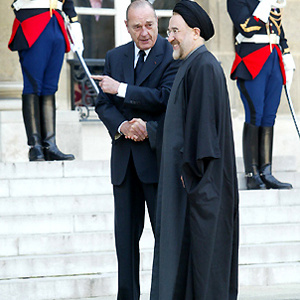Dignity in Practice

During recent years former president Mohammad Khatami’s foreign policy has been incessantly criticized by his political opponents—particularly by supporters of the current administration. The fact these critics never seem to heed is that in the Iranian political structure, foreign policies are the result of a collective decision made by all influential power circles, including (first and foremost) the Supreme Leadership, the Expediency Council, the National Security Council, and the elected administration. The basic unalterable tenets of the Islamic Republic of Iran’s diplomacy -“Wisdom, Expediency, and Dignity”- are the fruits of experiences gained within the last three decades.
Protocol: this is a keyword in diplomatic relations. For every state, a protocol is a system consisting of dos and don’ts in the cultural, religious, and social conventions of the country. The term protocol also refers to a set of principles that must be observed by dignitaries when visiting other countries. Former President Mohammad Khatami’s visit to France in October 1999 is one of the most interesting instances, demanding a close examination with regard to protocol as it is one of the exemplary cases that fulfilled the tenets of our diplomacy.
Those familiar with French culture are aware of the stature of traditions and formal protocols for Parisian diplomats. So, when in October 1999 Khatami made a state visit to France –after an earlier arrangement for a visit in April was canceled due to Iran’s ‘no wine on the table’ policy, political observers in France—and across Europe—were surprised when Paris agreed to abandon some protocol details with respect to Khatami and, in fact, to the Iranian nation. Abidance of those conventions by visiting dignitaries had been so unquestionable up until then that many European newspapers blamed the French president Jacques Chirac for disregarding what they called ‘France’s traditions’.
The dense fog covering Paris on the day of Khatami’s visit forced his aircraft to land after a 90-minute delay. The delay nonetheless did not prevent France’s then Prime Minister Lionel Jospin -who was due to start a working visit himself at the same time- from postponing his schedule to ensure that he had the opportunity to visit the Iranian president.
Despite diplomatic conventions, then French President Jacques Chirac decided to receive Mohammad Khatami not at top of the stairs of his palace entrance, but down on the pavement. Chirac’s move even caused the discontent of protocol officials of the French government. Chirac –who unlike his subordinates- appreciated Khatami as the symbol of a proud nation, overlooked protocol again when he spoke with the Iranian president not for the conventional forty-five minutes, but for one and a half hours, and accompanied his counterpart to the exit door of the presidential palace. Khatami’s meeting with senior French businessmen, EU officials, and visits to him from France’s cultural icons ensured that the trip became an over-achievement. The same sort of reception was given to Khatami by Malek Fahd, the late king of Saudi Arabia at Jeddah Airport in May 1999. And Khatami’s historic visit to Italy, his June 2000 visit to China (and his attendance at the Chinese Army parade); his trip to Malaysia (and its impact on the outlook shift of Eastern Asian nations towards Iran), and other instances too many to mention reveal how fruitful Iranian diplomacy during the presidency of Mr. Khatami actually was.

